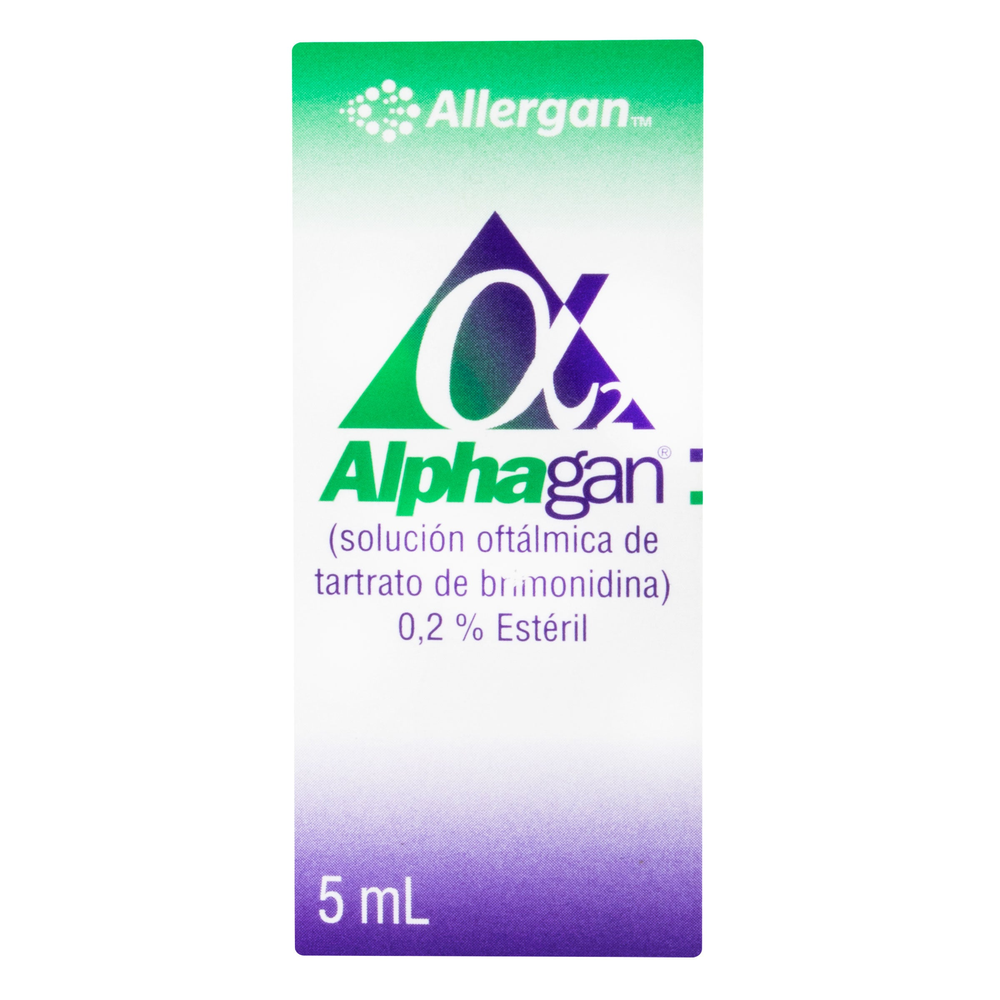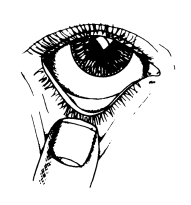

Alphagan

Ask a doctor about a prescription for Alphagan

How to use Alphagan
Package Leaflet: Information for the User
Alphagan, 2 mg/ml, Eye Drops, Solution
Brimonidine Tartrate
Read the package leaflet carefully before using the medicine, as it contains important information for the patient.
- Keep this leaflet, you may need to read it again.
- If you have any further questions, ask your doctor, pharmacist, or nurse.
- This medicine has been prescribed for you only. Do not pass it on to others. It may harm them, even if their symptoms are the same as yours.
- If you experience any side effects, including those not listed in this leaflet, please inform your doctor, pharmacist, or nurse. See section 4.
Table of Contents of the Leaflet
- 1. What is Alphagan and what is it used for
- 2. Important information before using Alphagan
- 3. How to use Alphagan
- 4. Possible side effects
- 5. How to store Alphagan
- 6. Contents of the pack and other information
1. What is Alphagan and what is it used for
Alphagan is used to lower the pressure in the eye.
The active substance in Alphagan is brimonidine tartrate, which reduces the pressure in the eye.
Alphagan can be used as a single medication in patients for whom beta-blocker eye drops are contraindicated or as an adjunctive therapy with other eye drops when intraocular pressure is not sufficiently controlled with single-agent therapy for open-angle glaucoma or ocular hypertension.
2. Important information before using Alphagan
When not to use Alphagan
- if you are allergic to brimonidine tartrate or any of the other ingredients of this medicine (listed in section 6);
- if you are taking monoamine oxidase inhibitors (MAOIs) and certain other antidepressants. You should inform your doctor if you are taking any antidepressants;
- in breastfeeding women;
- in newborns and children under 2 years of age.
Warnings and precautions
Before starting treatment with Alphagan, you should discuss it with your doctor:
- if you have or have had depression, your mental status is impaired, you have cerebral or coronary insufficiency, heart disease, impaired circulation, or hypotension;
- if you have or have had kidney or liver function disorders.
Children and adolescents
Alphagan is not recommended for use in children from 2 to 12 years old.
Alphagan should not be used in adolescents from 12 to 17 years old, as clinical studies have not been conducted in this age group.
Alphagan and other medicines
You should tell your doctor or pharmacist about all medicines you are taking now or have taken recently, as well as any medicines you plan to take, including those available without a prescription.
You should inform your doctor if you are taking:analgesics, sedatives, opioid analgesics, barbiturates, and regular alcohol consumption;
anesthetics;
medicines that affect blood circulation or lower blood pressure;
medicines that affect metabolism, such as chlorpromazine, methylphenidate, reserpine;
medicines that act on the same receptor as Alphagan, such as isoprenaline, prazosin;
monoamine oxidase inhibitors (MAOIs) and other antidepressants;
other medicines, even if their use is not related to eye disease;
or if the doses of currently used medicines have changed.
All of these factors may affect therapy with Alphagan.
Pregnancy and breastfeeding
If you are pregnant or breastfeeding, think you may be pregnant, or plan to become pregnant, ask your doctor or pharmacist for advice before using this medicine. You should not use Alphagan during pregnancy unless your doctor considers it necessary.
You should not breastfeed while using Alphagan.
Driving and using machines
After administering Alphagan to the eye, vision may become blurred or disturbed. These symptoms may be particularly troublesome at night or in low light.
Alphagan may cause drowsiness or a feeling of fatigue in some patients.
You should not drive or operate machinery until these symptoms have resolved.
Alphagan contains benzalkonium chloride
Alphagan contains 0.25 mg of benzalkonium chloride per 5 ml of solution, which corresponds to 0.05 mg/ml.
Benzalkonium chloride is a preservative that may be absorbed by soft contact lenses and change their color. You should remove contact lenses before administering the drops and wait at least 15 minutes before putting them back on.
Benzalkonium chloride may also cause eye irritation, especially in people with dry eye syndrome or disorders affecting the cornea (the transparent layer on the front of the eye).
If you experience any abnormal sensations in the eye, stinging, or pain in the eye after using this medicine, you should contact your doctor.
3. How to use Alphagan
This medicine should always be used exactly as your doctor has instructed. If you are unsure, ask your doctor or pharmacist.
Use in adults
The recommended dose of Alphagan is one drop into each affected eye, administered twice daily, approximately 12 hours apart. You should not change the dose or stop using Alphagan without consulting your doctor.
Use in children under 12 years of age
Alphagan should not be used in children under 2 years of age.
Alphagan is not recommended for use in children (2-12 years old).
Method of administration
Alphagan should be administered only into the eyes. Before administering the drops, you should always wash your hands thoroughly.
If you are using Alphagan with other eye drops, you should wait at least 5-15 minutes between administering Alphagan and the other drops. The drops should be administered according to the following instructions:




- 1. Tilt your head back and look up at the ceiling.
- 2. Gently pull down the lower eyelid to form a small pocket.
- 3. Squeeze the inverted dropper and release one drop of solution into the pocket.
- 4. Close your eye and press the lacrimal sac in the inner corner of the eye for about 1 minute.
If the drop does not get into the eye, try again.
Do not touch the eye or objects with the dropper tip.
Replace the cap immediately after use and tighten the bottle.
Using more Alphagan than prescribed
Adults
In adults who have been given more drops than prescribed, the reported adverse reactions were those currently known to occur with Alphagan.
In adults who have accidentally ingested Alphagan, a decrease in blood pressure has been reported, followed by an increase in blood pressure in some patients.
Children
Severe adverse reactions have been reported in children who have accidentally ingested Alphagan.
The following symptoms have been observed: drowsiness, decreased muscle tone, decreased body temperature, pallor, and difficulty breathing. If these symptoms occur, you should contact your doctor immediately.
Adults and children
If Alphagan is ingested or more than the prescribed dose is used, you should contact your doctor immediately.
Missing a dose of Alphagan
If you miss a dose, you should take it as soon as possible. However, if it is almost time for the next dose, you should skip the missed dose and continue with your regular dosing schedule. Do not take a double dose to make up for the missed dose.
Stopping treatment with Alphagan
To be effective, the medicine should be used every day. Do not stop using Alphagan without consulting your doctor.
If you have any further questions about using this medicine, ask your doctor or pharmacist.
4. Possible side effects
Like all medicines, Alphagan can cause side effects, although not everybody gets them.
The following local side effects related to the eye may occur:
Very common (may affect more than 1 in 10 people):
eye irritation (eye redness, burning, stinging, feeling of a foreign body, itching, follicles or white spots on the conjunctiva),
blurred vision,
eye allergic reactions.
Common (may affect up to 1 in 10 people):
local irritation (lid inflammation and edema, conjunctival edema, presence of discharge in the conjunctival sac, eye pain and tearing),
increased sensitivity to light,
corneal erosion and spots on the cornea,
dry eye,
conjunctival blanching,
visual disturbance,
conjunctivitis.
Very rare (may affect up to 1 in 10,000 people):
inflammation of the inner eye,
miosis.
Frequency not known (frequency cannot be estimated from the available data):
eyelid itching.
The following general side effects related to the whole body may occur:
Very common (may affect more than 1 in 10 people):
headache,
dry mouth,
feeling of tiredness and/or drowsiness.
Common (may affect up to 1 in 10 people):
dizziness,
flu-like symptoms,
gastrointestinal symptoms,
taste disturbances,
general weakness.
Uncommon (may affect up to 1 in 100 people):
depression,
palpitations or arrhythmias,
nasal dryness,
generalized allergic reactions.
Rare (may affect up to 1 in 1,000 people):
shortness of breath.
Very rare (may affect up to 1 in 10,000 people):
insomnia,
fainting,
hypertension or hypotension.
Frequency not known (frequency cannot be estimated from the available data):
skin reactions including skin redness, facial swelling, itching, rash, and vasodilation.
Reporting side effects
If you experience any side effects, including those not listed in this leaflet, please inform your doctor or pharmacist. You can also report side effects directly to the Department of Drug Safety Monitoring of the Office for Registration of Medicinal Products, Medical Devices, and Biocidal Products,
Jerozolimskie Avenue 181C
02-222 Warsaw
Phone: +48 22 49 21 301
Fax: +48 22 49 21 309
Website: https://smz.ezdrowie.gov.pl
You can also report side effects to the marketing authorization holder.
By reporting side effects, you can help provide more information on the safety of this medicine.
5. How to store Alphagan
Keep the medicine out of the sight and reach of children.
Alphagan should be stored below 25°C.
Do not use this medicine if the protective seal on the bottle is broken before the first opening.
Do not use this medicine after the expiry date stated on the label and carton (EXP). The expiry date refers to the last day of the month.
28 days after opening the bottle, it should be discarded, even if there is still solution left.
Medicines should not be disposed of via wastewater or household waste. Ask your pharmacist how to dispose of medicines no longer required. This will help protect the environment.
6. Contents of the pack and other information
What Alphagan contains
- The active substance is brimonidine tartrate. 1 ml of solution contains 2.0 mg of brimonidine tartrate, equivalent to 1.3 mg of brimonidine.
- The other ingredients are: benzalkonium chloride, polyvinyl alcohol, sodium chloride, sodium citrate dihydrate, citric acid monohydrate, purified water, hydrochloric acid (to adjust pH to 6.3-6.5), and sodium hydroxide (to adjust pH to 6.3-6.5).
What Alphagan looks like and contents of the pack
Alphagan is a clear solution with a slight greenish-yellow or light greenish-yellow color. The solution is filled in a polyethylene bottle with a dropper. One carton pack contains 1 bottle of 2.5 ml, 5 ml, or 10 ml solution. Not all pack sizes may be marketed.
Marketing authorization holder
AbbVie Sp. z o.o.
Postępu 21B
02-676 Warsaw
Phone: 22 372 78 00
Manufacturer
Allergan Pharmaceuticals Ireland
Castlebar Road
Westport, Co. Mayo
Ireland
Date of last revision of the leaflet:
- Country of registration
- Active substance
- Prescription requiredYes
- Manufacturer
- ImporterAllergan Pharmaceuticals Ireland
- This information is for reference only and does not constitute medical advice. Always consult a licensed doctor before taking any medication. Oladoctor is not responsible for medical decisions based on this content.
- Alternatives to AlphaganDosage form: Drops, 2 mg/mlActive substance: brimonidinePrescription requiredDosage form: Drops, 2 mg/mlActive substance: brimonidineManufacturer: Rafarm S.A.Prescription requiredDosage form: Drops, 2 mg/mlActive substance: brimonidineManufacturer: Zakłady Farmaceutyczne POLPHARMA S.A.Prescription required
Alternatives to Alphagan in other countries
The best alternatives with the same active ingredient and therapeutic effect.
Alternative to Alphagan in Ukraine
Alternative to Alphagan in Spain
Online doctors for Alphagan
Discuss dosage, side effects, interactions, contraindications, and prescription renewal for Alphagan – subject to medical assessment and local rules.














